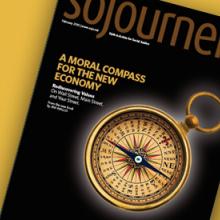Business Ethics
THE FIRST TIME I saw John Rush was during a 2015 political forum at a local high school in Columbus, Ohio. Rush was running for city council, and though all the candidates had been invited, many didn’t bother to show up. As Rush began his presentation, he brought empty chairs up on the stage and made some quip about how the chairs were waiting for the absent candidates. The joke was not cryptic or unkind; it drew gentle laughter and applause from the audience. I didn’t know what party Rush belonged to, but I was captivated.
As a longtime pastor in Columbus, I’d seen a lot of candidates for city council. All of them had the usual rash of promises: They would create jobs; they cared about “the least of these”; they listened to the hearts of the people. Voting for them would help change the world.
But Rush seemed different. Though he was a white man with a military-style buzzcut speaking to a room full of African Americans, he didn’t seem shy or uncomfortable. He didn’t make a lot of promises. He just talked about how he knew what people were going through, and his knowledge seemed genuine, like he had “been there.” He mentioned growing up really poor, in Appalachia, and how that felt. He joked about being an evangelical who cared about more than the wedge issues of abortion and same-sex marriage. He talked about knowing how to listen to and appreciate all kinds of people. Nobody, it seemed, was an outsider to him.
Rush eventually lost his bid for election, but the more I learned about him, the more fascinated I became. He spent his early years in a trailer park surrounded by racism, joined the Marines, and later returned to the Midwest to help found a nondenominational church in Chicago. He now runs a business that helps people who were incarcerated or caught in human trafficking reintegrate into society. He was an ordinary person, leading an extraordinary life.
WHAT DO PATAGONIA, Ben & Jerry’s, and Etsy have in common? They’re all B Corporations. As part of the B Corp movement, they have committed to using business to build a better and more sustainable world. Along with 2,294 other corporations, they have signed a “Declaration of Interdependence” and are attempting to redefine the for-profit sector.
To become a B Corp, businesses must complete the B Impact Assessment, which scores the company on its environmental impact, relationship to its workforce, commitment to the community, and transparency in governance, as well as the benefit of the product to customers.
In 2016, the B Corp Community launched the “inclusive economy challenge” to encourage for-profit entities to think critically about the economy and work to create opportunities for all people to flourish. During the pilot year, 175 B Corps took on the challenge; together they eliminated wage gaps and expanded company ownership.

Tithe box via http://www.wylio.com/credits/Flickr/4089420589.
When Republican presidential hopeful Mitt Romney released his federal tax returns for the past two years, he disclosed that he and his wife, Ann, gave about 10 percent of their income to their church, a well-known religious practice called tithing.
In that way, the Romneys are typical Mormons, members of a church that is exceptionally serious about the Old Testament mandate to give away one-tenth of one's income.
But compared to other religious Americans, the Romneys and other Mormons are fairly atypical when it comes to passing the plate. Across the rest of the religious landscape, tithing is often preached but rarely realized.
Research into church donations shows a wide range of giving, with Mormons among the most generous relative to income, followed by conservative Christians, mainline Protestants and Catholics last.
Over the past 34 years, Americans' generosity to all churches has been in steady decline, in good times and in bad, said Sylvia Ronsvalle, whose Illinois-based Empty Tomb Inc. tracks donations to Protestant churches.
Ronsvalle's research shows that since 1968, contributions have slowly slumped from 3.11 percent of income to 2.38 percent, despite gains in prosperity.
In her view, churches have failed "to call people to invest in a much larger vision." She believes that explains why giving to missions, distant anti-poverty programs or faraway ministries has sunk faster than giving for the needs of local congregations.
"Think about how much of our lives we spend at work," the executive of a New York publishing house said wistfully to me.
Eight principles for life in an honest, value-centered, competitive organization.




